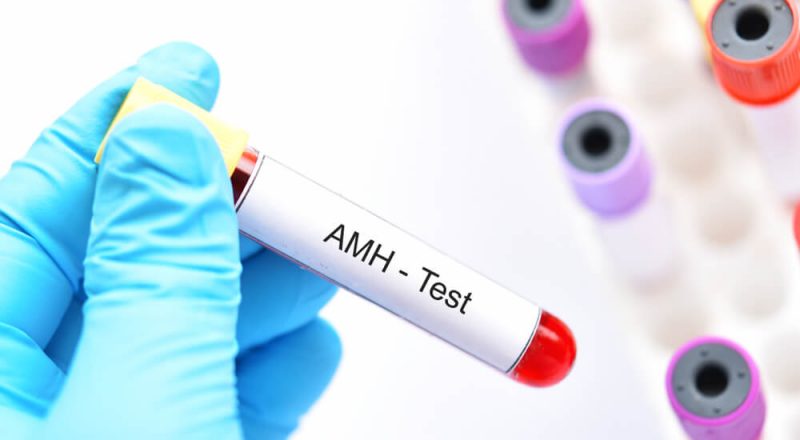Anti-müllerian hormone (AMH) test is mainly done to measure the level of AMH in the blood. Another name for this test is AMH hormone test, müllerian-inhibiting hormone, MIH, müllerian inhibiting factor, MIF, müllerian-inhibiting substance, MIS.
AMH hormone is produced in the reproductive tissues of both males and females. If you are expecting a baby, anti-Müllerian hormone (AMH) is fundamental in their development. It plays a vital role in developing the sex organs of a fetus during the first few weeks of pregnancy.
After conception, the fetus, by default, has genes to develop either as male (XY genes) or female (XX genes). If the baby has XY genes, aka the male chromosome, higher levels of AMH are produced along with various male hormones. This hinders the growth of female organs and supports the development of male organs. There is a condition knows as ambiguous genitalia or intersex, where the baby’s genitals may not be distinguished as male or female because the baby may have the organ of both sexes.
This condition happens if there is not an adequate amount of AMH to obstruct the development of a female organ. Suppose the expected baby has female (XX) genes; low amounts of AMH are made, allowing the development of female reproductive organs.
AMH also plays a different role in puberty and adult ovaries and testes. After puberty, the ovaries start producing AMH. The higher the number of egg cells, the higher is the level of AMH. In women, the AMH levels can provide information about reproductive health and the ability to get pregnant. The test may further support the diagnosis of menstrual disorders or monitor women’s health with certain types of ovarian cancer. It is important to note that a low level of AMH is normal in young girls and women after menopause.
What is the Anti-mullerian hormone (AMH) test used for?
An AMH test is usually done to check a woman’s ability to produce eggs that, when fertilized, can result in pregnancy. In general, a woman’s ovaries produce thousands of eggs during her fertile years. But the number starts to decline as woman ages. AMH levels determine ovarian reserve, i.e. how many potential egg cells a woman has left. Higher ovarian reserve states that the woman has a better chance of getting pregnant. Whereas if the ovarian reserve is low means that a woman may face trouble while trying to conceive. AMH test can be used during family planning; the test will help the couple decide if they can delay(in case of higher ovarian reserve) or get pregnant early(in lower ovarian reserve).
AMH tests may also be used to:
- Predict the commencement of menopause, i.e. time that marks the end of the menstrual cycles. Menopause means that woman can’t become pregnant anymore.
- Aid in understanding the reason for amenorrhea, the absence of menstruation.
- Help diagnose polycystic ovary syndrome (PCOS), a hormonal disorder that is a well-known cause of female infertility. A high level of AMH may mean you have polycystic ovary syndrome (PCOS).
Who needs an AMH test?
- The doctor mainly advises AMH tests to woman’s who have tried conceiving naturally but failed. Tests help determine the chances of conceiving a baby are.
- This test also helps predict how well one may respond to fertility treatment like in vitro fertilization (IVF) and its success rate. High levels of AMH mean there will be a better response to treatment. While Low levels of AMH mean the response may not be well to treatment.
- Women experiencing polycystic ovary syndromes (PCOS) symptoms like acne, excess body or facial hair, weight gain, amenorrhea or menopause may also require an AMH test.
What happens during an AMH test?
No special preparation is required for an AMH test. A health care professional will use a small needle to collect a blood sample from a vein in your arm. The needle is inserted into the arm’s vein, and later the blood is contained in a test tube or vial. Usually, a slight prick is felt when the needle goes in or out. The whole process typically takes less than five minutes.
For more information, visit https://www.rainbowfertilitycentre.in/invitro-fertilization.php or call: 085911 77987 to schedule an appointment with our IVF Specialist – Dr. Krutika Makhija.
